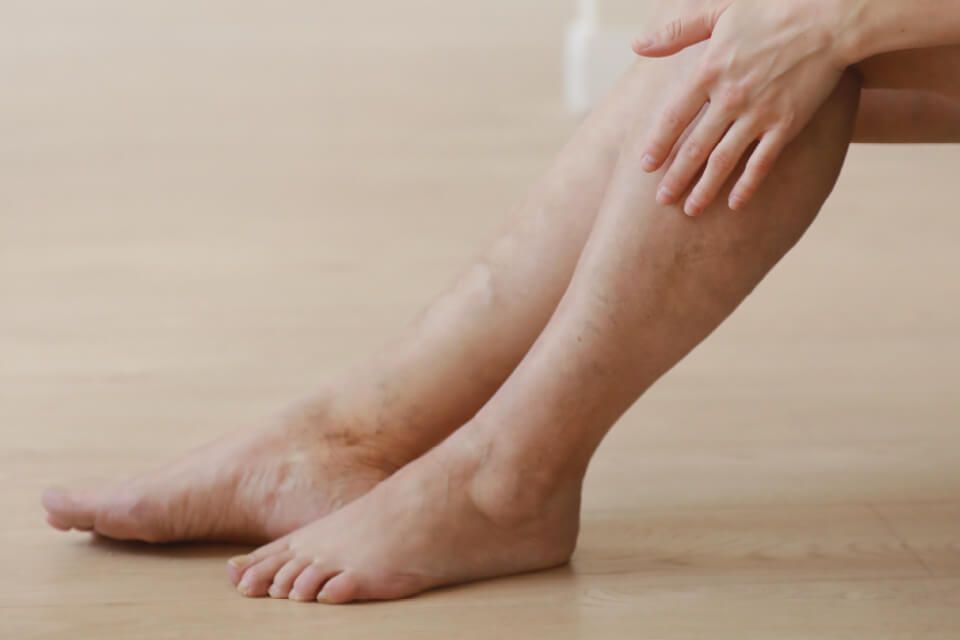What to Know
Chronic venous insufficiency (CVI) and varicose vein disease occurs when the valves that direct blood inside veins, usually the legs, stop working properly. Instead of directing blood upward toward the heart, the malfunctioning valves allow blood to flow backward down the vein. This reflux creates an accumulation of blood inside the veins and puts increased pressure on vein walls, and can lead to the development of enlarged, varicose veins that worsen over time.
With a simple outpatient procedure, out skilled physicians can drastically improve your circulation – and your symptoms.
Know the Signs
Chronic venous insufficiency (CVI) and varicose vein disease is thought to affect nearly 40 percent of the population and can be the result of both inherited and acquired conditions. Most often it affects those in middle or old age, especially women who have had multiple pregnancies. If you have any of the following symptoms, all of which typically affect the legs — particularly the lower legs, it is important to seek medical attention.
- Varicose veins, which are bluish-purple bulges that appear on the skin's surface.
- Spider veins that appear as starburst clusters, web-like lines, or short, fine lines on the surface of the skin.
- An eczema-like rash
- Deep reddish-brown skin discoloration
- Thickening and hardening of the skin
- Venous stasis ulcers
- Open wounds that fail to heal on their own
- Sudden swelling
- Pain or tenderness
- Warm-feeling skin
- A feeling of leg heaviness
- Itchiness
- Restlessness
- Muscle cramps
- Burning or throbbing
Are you at risk?
Familiarize yourself with the risk factors associated with chronic venous insufficiency (CVI) and varicose vein disease. It's time to take control of your vascular health.
- Age - more common above age 50
- Gender - women are at higher risk
- Obesity
- Family history
- Smoking
- Reduced mobility
- Prolonged sitting or standing
- Pelvic tumors
- Vascular malformations and infections
- Certain genetically inherited conditions
Guiding the path to vascular health.
During the initial visit at Richmond Vascular Center for chronic venous insufficiency (CVI) and varicose vein disease, our knowledgeable providers will request a thorough medical history and perform a comprehensive physical exam that includes a complete evaluation of the venous system within the legs. This evaluation will often include an ultrasound exam of lower extremity veins performed by our expert ultrasonographer.
Once the exam process is complete, the provider will discuss the results and recommend a customized vein treatment plan. Patients will receive detailed information regarding what to expect before, during, and after their treatment.
Leading the way in vascular care.
The list of unpleasant side effects is lengthy, but there is no need to suffer with chronic venous insufficiency (CVI) or varicose vein disease. Richmond Vascular Center offers a variety of low-risk and highly effective minimally invasive treatments in the comfort of a true outpatient environment. Treatments could include the following:
- Compression therapy is often recommended as a first line of conservative, non-invasive treatment. Patients with pain in their lower extremities due to leg swelling or enlarged veins wear compression clothing, like stockings, to aid in the relief of symptoms or ulcer healing.
- Ablation procedures close veins that function abnormally. This redirects blood into healthy veins and provides symptom relief. Our team of dedicated physicians offer a variety of innovative ablation techniques, such as:
- Radiofrequency ablation delivers high frequency radio waves via a tiny catheter, heating the problem vein, and causing its walls to shrink and close
- VenaSeal™ delivers a small amount of a specially formulated medical adhesive to seal or close the unhealthy vein
- Varithena™ uses a concentrated foam solution to seal or close malfunctioning veins
- Sclerotherapy, the most common treatment for spider veins, uses a tiny needle to inject a liquid or foam solution into the vein, causing the vein to contract, and allowing blood to reroute to normal veins
- Microphlebectomy is a minimally invasive treatment that removes portions of varicose veins through tiny, slit-like incisions in the skin.
Sharing knowledge. Empowering Patients.
What are the benefits of receiving CVI/ Varicose Vein treatments at Richmond Vascular Center?
As a trusted partner with an established reputation for excellence, Richmond Vascular Center is dedicated to providing high-quality care in a convenient, outpatient setting. With no overnight hospital stays required, procedures are both cost effective and efficient. Our expert physicians use proven methods to ensure patients return to normal activities with no pain and provide subspecialized support for wound treatment and prevention
Will my insurance cover both the diagnostic tests and procedures done in the outpatient setting?
Yes. At Richmond Vascular Center, our patient-focused staff is committed to ensuring that all referrals and authorizations are completed prior to your initial visit.
Most insurance companies cover CVI/varicose vein treatment if it causes health problems and is deemed medically necessary. Sometimes venous conditions, such as spider veins, are considered cosmetic by insurance companies and may not be covered. Our team will determine if a vein condition is causing health problems or if the issue is simply cosmetic.
How can I prevent CVI/varicose vein progression after treatment?
Many people can manage the symptoms of CVI/varicose veins and stop the progression of this disease through lifestyle changes, such as:
- Quitting smoking
- Balancing your diet
- Exercising regularly
- Maintaining a healthy weight
- Avoiding sitting or standing for extended periods of time
placeholder

Friendly and professional staff. Very short wait time. They took their time to figure out what was happening with my legs!
I had some veins that needed taken care of. I can't recommend any group more! From the moment I walked into the door everyone was kind, friendly and professional. Having just completed the procedure, I couldn't be happier with the outcome. I HIGHLY RECOMMEND this wonderful team!


